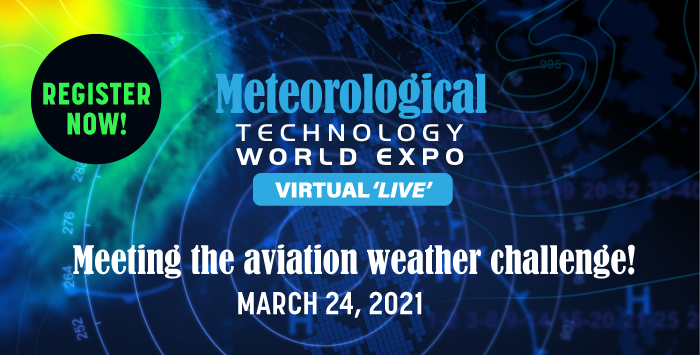Aviation meteorologists, airline and airport operators and air navigation services searching for a global overview of the trends and technologies shaping aviation meteorology will be able to hear from experts at the WMO, EUMETNET, IATA, NOAA, SESAR and more at next week’s Meteorological Technology World Expo Conference for Aviation Meteorology (March 24, 2021) – a brand-new, free-to-attend, one-day online conference from the publisher of Passenger Terminal World and the organizer of Passenger Terminal Expo and Meteorological Technology World Expo.
Participants can expect a highly rewarding and insightful exchange of ideas, with live interaction and networking fully enabled and encouraged during the event, which takes place online for maximum convenience. Featuring two dedicated streams and over 35 expert speakers, here are just a few of the highlights in store:
EUMETNET coordinated service to aviation
 Lauren Donohue, aviation program coordinator at EUMETNET, will explore aspects of the current coordinated MET provision to organizations such as Eurocontrol’s Network Manager and how it may evolve in the future as aviation recovers over the next few years. Much of the work of the EUMETNET Aviation Program is to ensure a consistent and coordinated approach to future cross-border forecasting, ensuring that weather information is available and communicated to all aviation stakeholders in a consistent way.
Lauren Donohue, aviation program coordinator at EUMETNET, will explore aspects of the current coordinated MET provision to organizations such as Eurocontrol’s Network Manager and how it may evolve in the future as aviation recovers over the next few years. Much of the work of the EUMETNET Aviation Program is to ensure a consistent and coordinated approach to future cross-border forecasting, ensuring that weather information is available and communicated to all aviation stakeholders in a consistent way.
Covid-19’s impact on forecasting to aviation
Covid-19 has dramatically affected the demand for aviation. Focusing on the insights from aviation meteorologists, and the impact on customers, Covid-19 has brought differing challenges, including reduced demand for services, reduced revenue, increased capacity within the network and new ways of operating. The UK Met Office’s James Shapland, squad lead – aviation commercial, will explore some of these scenarios, provide initial subjective analysis and review ways of working that may benefit the industry in the future.
The impact of Covid-19 on EMADDC
 Surprisingly, Covid-19 is not purely negative, argues Jan Sondij, senior advisor aviation meteorology, KNMI. It has accelerated the development of the European Meteorological Aircraft Derived Data Centre (EMADDC) and provided an opportunity to show the added value. EMADDC is an operational center in development to utilize all aircraft in the European airspace to derive wind and temperature observations. Jan’s talk will provide a high-level overview of the aim and status of EMADDC and the impact of Covid-19.
Surprisingly, Covid-19 is not purely negative, argues Jan Sondij, senior advisor aviation meteorology, KNMI. It has accelerated the development of the European Meteorological Aircraft Derived Data Centre (EMADDC) and provided an opportunity to show the added value. EMADDC is an operational center in development to utilize all aircraft in the European airspace to derive wind and temperature observations. Jan’s talk will provide a high-level overview of the aim and status of EMADDC and the impact of Covid-19.
Scientific advancement supporting evolving service needs
The World Meteorological Organization (WMO), as a specialized agency of the United Nations, is playing a leading role in the development and implementation of new and improved meteorological services for aviation. WMO’s Stéphanie Wigniolle and Greg Brock will provide an overview of the prevailing drivers for change and explore several key areas of ongoing meteorological scientific research. The presentation will also provide insight into the potential impacts of climate change and variability on aviation operations now and in the future.
Future evolution of the ICAO World Area Forecast System
 Matt Strahan, international operations chief of the National Oceanic and Atmospheric Administration (NOAA), will talk about the future of the ICAO World Area Forecast System. The World Area Forecast System produces significant weather forecast charts, plus gridded forecasts of wind, temperature, relative humidity, turbulence, icing and thunderstorms. The Significant Weather Charts, best suited for situational awareness, will be greatly improved in 2023. The gridded forecasts, for use by flight planning systems, will also be dramatically improved over the next few years. However, the user community will need to update their systems in order to make use of the improvements.
Matt Strahan, international operations chief of the National Oceanic and Atmospheric Administration (NOAA), will talk about the future of the ICAO World Area Forecast System. The World Area Forecast System produces significant weather forecast charts, plus gridded forecasts of wind, temperature, relative humidity, turbulence, icing and thunderstorms. The Significant Weather Charts, best suited for situational awareness, will be greatly improved in 2023. The gridded forecasts, for use by flight planning systems, will also be dramatically improved over the next few years. However, the user community will need to update their systems in order to make use of the improvements.
Click here to view the full program and speaker list, and register – for FREE – now!


